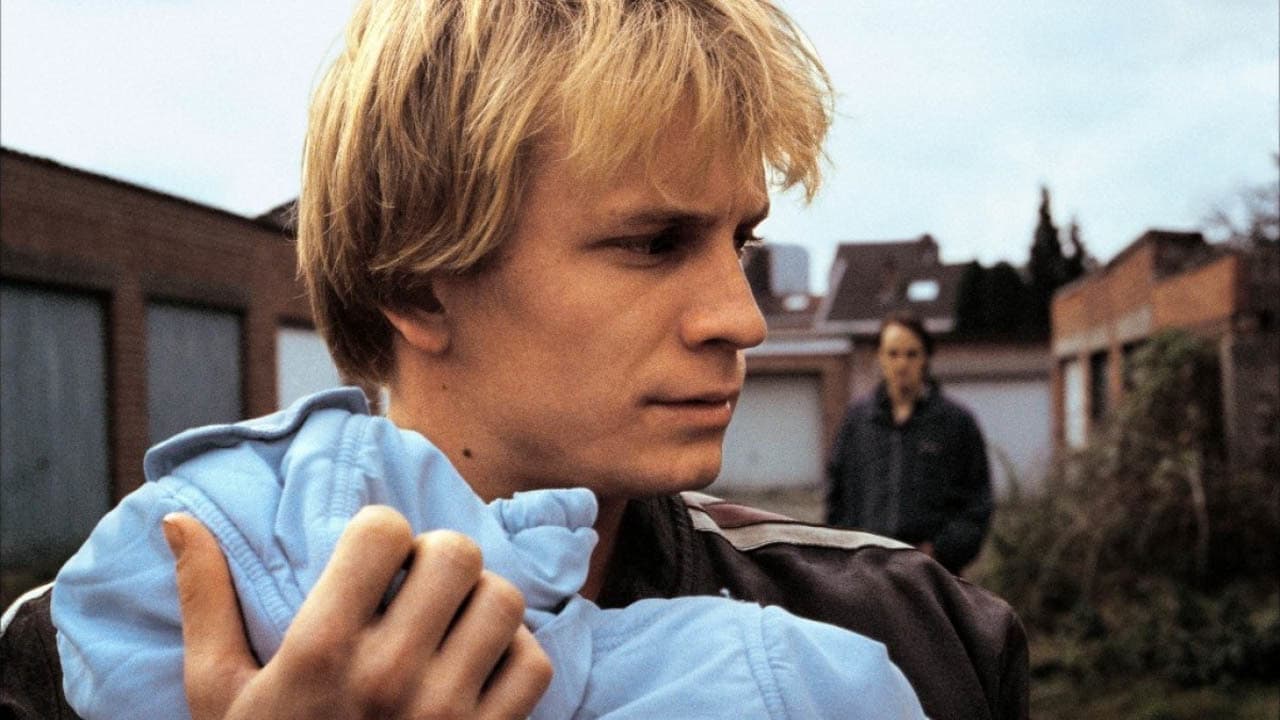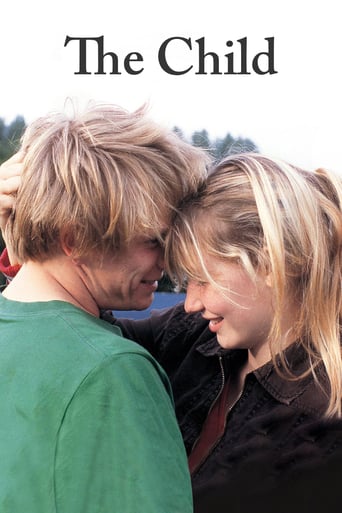



Masterful Movie
Better than most people think
Like the great film, it's made with a great deal of visible affection both in front of and behind the camera.
View MoreI didn’t really have many expectations going into the movie (good or bad), but I actually really enjoyed it. I really liked the characters and the banter between them.
View MoreDramatic, realistic, proposing honest portrait of an age, generation, near reality. A film about parenthood. Bitter, cold, well made. And about the build of responsability. All - gived in wise manner. With admirable force. A father. His son. A decision. And the transformation. And the price of option.
View MoreIn the beginning of the film, one feels that Sonia, an eighteen year old gentle mother is the main character of L'infant, and the film would revolve around her struggle of bringing up her kid as well as getting along with her criminal husband. But soon enough, Bruno, the father, takes the main stage. He runs a gang with two teenage boys. He steals and sells everything. He is also devoid of any human emotion. When Sonia returns from the hospital with the newborn child, she finds that Bruno has rented her apartment to another couple. Desperate Sonia seeks out Bruno and finds him in a traffic signal. It seems that when Sonia was in hospital giving birth to their child, Bruno never visited her. Bruno is no way emotionally attached with the child. Interestingly Sonia doesn't apparently have any problems with these. Sonia is also very much aware of what Bruno does for a living. She gets on with him all right, and the film depicts some wonderful love and fun sequences between the two.Few days later while waiting in a long queue, Sonia tells Bruno to take Jimmy (their kid) out for a stroll, Bruno accepts the offer and on his way decides to sell off the child. A decision that comes as a shock. He makes one or two phone calls and tells them that they have taken this decision jointly. He gets five thousand Euros in exchange, and returns with the empty perambulator. Bruno tells Sonia and shows her the money he has got in exchange. He also naively tells Sonia that they can have another kid, what's the big deal. Sonia faints and falls on the ground. Bruno didn't expect this. He never though about how Sonia would react, didn't think about the consequences. He takes Sonia in his laps and goes out to search for a cab that will take them to the hospital. Now, here happens an interesting thing, in the beginning I said that Bruno is devoid of any human emotion, yes that was true till this point, now it seems a bit different. If that was really the case then Bruno could have simply left Sonia there and escaped. I mean, that would not be surprising from him. He is someone who can simply sell off their nine day old kid without even bothering about kid's mother. When you really see him doing that, you kind of refuse to believe whatever that is going on. You find it stretched too far. What I mean is, one can then always stretch it a bit further. But the fact that Bruno can't leave Sonia there, proves that he has some attachment with her. Seeing Sonia like this he also decides to take the child back. Well, he had some human possibility still left with him. From here on the film is quite predictable. We now know the limits of Bruno's inhuman side, but his human possibilities are still unexplored. Bruno will understand his mistakes and will apologies (seems like his first apology in life), though it takes some time for him to do so, and in between another incident happens. But let's not go into that, Bruno will cry his heart out and Sonia will forgive him. And the film will end with this positive note, well done, great, whatever, anyways I have two points to make, one, who is Sonia? I don't know where she comes from; don't know how she manages to fall in love with someone like Bruno. And even after everything she goes to meet Bruno in the jail and again, manages to forgive him. It seems very strange to me. Is it Christian charity? Is it the so called love and forgiving nature of womanhood? And second, the film ends on a positive note with Bruno realizing, that's fine. But isn't the final redemption a bit inconsistent, a bit forced? I have seen films where illegitimate actions are portrayed as cool and having no consequences, I have my share of problems with that thing too, but really we have been seeing criminals like Bruno's final redemption for ages in films, and probably it will continue for ages too, it's a bit weird for me, that's all.The film, L'infant uses a lot of hand held camera, which gives a marvelous result, it has natural sounds and no background music, making wise, it's definitely non-Hollywood and that is great. Both Bruno and Sonia were amazing in their performance. The film also uses long takes at certain moments remarkably well. Two instances come to mind right now, one when Bruno leaves the kid on the floor and waits outside for the money, the camera stays with him, and secondly when Bruno and Steve hide themselves from the cop. We don't get to see what is happening on the other side, and it really builds up the suspense. A similar treatment was also affectively used in No Country for Old Men among others, and it can be very moving if properly used.
View MoreA captivating 'peephole' into welfare-life in Belgium's dark under belly, L'infant is a unique movie in its stark realism, intentional lack of a musical backdrop, and limited, authentic and sometimes painfully awkward dialogue. It centres around a young, poor couple - Bruno (Jeremie Renier) and his girlfriend Sonya (Deborah francois), and their meandering descent from 'carefree' love. They are seen play fighting and horsing around many times at the beginning of the movie and their lack of meaningful (or any) dialogue lends itself to the sense of childishness, youthfulness and naiveté that characterizes them both. Bruno thinks 'working is for fools' and sporadically brings in money from petty criminal activities carried out with the help of his underage 'gang' of disaffected school boys. It is clear from the start that Bruno is immature, thoughtless, impulsive and self-obsessed, and one cannot help but be contemptuous of his unawareness of others' needs or feelings. When Sonia shows him their baby son for the first time, Bruno shows next to no interest in the baby. Although one sees his fondness for Sonia, his immaturity does not allow him to see beyond the moment, or beyond the next opportunity to make 'easy' money. Neither Sonia or Bruno grasp the 'reality' of having a baby nor how it will impact their lives; Sonia, however, bearing the brunt of the responsibility and having, it appears, some maternal instinct cannot escape that reality as readily as her lover. Even so, she is painfully unaware of the extent of Bruno's recklessness when she gives him the baby to 'take for a walk'; Bruno seizes upon this as the ultimate money-making opportunity, and seeks out an illegal, underground 'adoption agency' where he can sell their baby and make more money. His naivety is apparent in his total astonishment at Sonia's reaction to this shocking misdemeanour and his desperate pleas - 'but the money's for us! We can have another one (baby)'. These puerile words seal his fate in Sonia's eyes.L'infant, despite its minimalism, harsh realism and dismal portrayal of life, is nonetheless entrancing and engrossing; from extended 'road-crossing' scenes, to Bruno's realisation that he really has over-stepped the line and must return to the criminal 'baby adopters' to get his child back. It is here we see that beneath his brash, indifferent, superficially carefree exterior is a child-like, fearful young man, very much in love with Sonia, and totally unhinged by her contempt for him. Even after a nail bitingly suspenseful scene where Bruno retrieves the child, he is still backed into a corner by his foolish actions and helplessly sucked into a vortex of blackmail, violence and censure. He is now very much a tiny fish, swimming against the current, in a large and vicious pond. One realises that maybe Bruno, all along, is 'L'infant'; so foolish and infantile his actions, and so desperate his desire for forgiveness and acceptance. L'infant's cinematic naturalism, sparse dialogue, suspenseful scenes, and bleak realism make it a great film for the discerning movie goer.
View MoreAs long as you only read the synopsis, you will think the film is about how the eruption of a new-born is going to change the life of this (too?) young couple. It is, it's true, especially about how becoming a father will change him. Or not. Because the eponymous child is not the new-born, it's him definitely. And the point when he becomes responsible happens regarding someone else than his son: does he do for the other what he feels unable to do for his own son? I don't know, I am not sure falling crying in his partner arms is not just another childish way of getting off his mistakes: too easy to just lose freedom for some months, at the maximum few years, given what he did. Yes forgiveness is important, but children don't learn anything if you forgive them as soon as they cry. Though a good insight in misery. Not financial, even if this one is cause and effect all along. But affective misery, educational misery, cultural misery, socialization misery etc... Where it's hard to not stay a child if nobody helps you to grow up.
View More